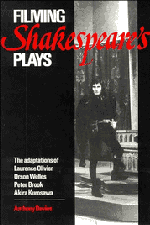 Filming Shakespeare's Plays
Filming Shakespeare's Plays Published online by Cambridge University Press: 01 June 2011
Welles's Othello raises basic questions about the nature of film adaptations of stage plays more incisively than his Macbeth. One reason for this is the fact that Welles's presentational concepts in the earlier film developed from his stage productions at Harlem and Utah. Another is that film's generic affinity with the ‘horror film’. Thirdly, Macbeth was so much better in concept than it was in execution, that its initial impact on being screened failed to elicit much serious response either as Shakespearean or cinematic drama. Only the French critics, especially Bazin and Beylie, recognized the thematic articulation in the film's spatial strategies.
The techniques of Othello are considerably more refined. The theatricality of constructed décor gives way to the realism of sea and sky, and to the architectural polarities of Venice and Mogador. For the first time in this examination of specific Shakespearean films, we are faced with a film which aims at reconciling theatrical drama with the realism of non-theatrical spatial elements. The sustained insistence with which the film achieves this reconciliation, and its integration of architectural realism not simply as a justification for cinema but as thematic statement, is the major distinction which distances Welles's Othello from every other major Shakespearean film. The film gains its special adaptive stature, too, from Welles's cinematic language, which is fused with the dramatic energy of the play.
To save this book to your Kindle, first ensure no-reply@cambridge.org is added to your Approved Personal Document E-mail List under your Personal Document Settings on the Manage Your Content and Devices page of your Amazon account. Then enter the ‘name’ part of your Kindle email address below. Find out more about saving to your Kindle.
Note you can select to save to either the @free.kindle.com or @kindle.com variations. ‘@free.kindle.com’ emails are free but can only be saved to your device when it is connected to wi-fi. ‘@kindle.com’ emails can be delivered even when you are not connected to wi-fi, but note that service fees apply.
Find out more about the Kindle Personal Document Service.
To save content items to your account, please confirm that you agree to abide by our usage policies. If this is the first time you use this feature, you will be asked to authorise Cambridge Core to connect with your account. Find out more about saving content to Dropbox.
To save content items to your account, please confirm that you agree to abide by our usage policies. If this is the first time you use this feature, you will be asked to authorise Cambridge Core to connect with your account. Find out more about saving content to Google Drive.